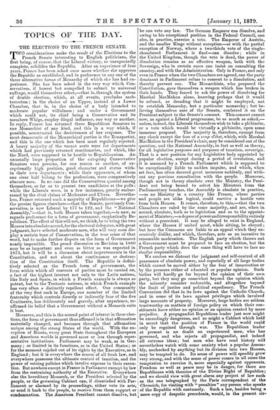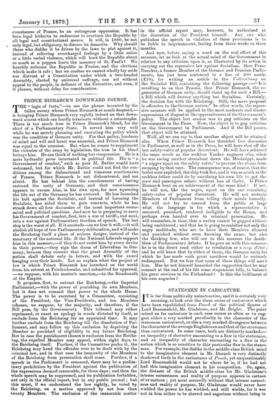TOPICS OF THE DAY.
THE ELECTIONS TO THE FRENCH SENATE.
TWO considerations make the result of the Elections to the French Senate interesting to English politicians, the first being, of course, that the Liberal victory, so unexpectedly complete, solidifies the Republic. After an experience of four years, France has been asked once more whether she approves the Republic as established, and in preference to any one of the three alternative forms of Monarchy of which she has had ex- perience. She has been asked in the very way which Con- servatives, if honest but compelled to submit to universal suffrage, would themselves select,—that is, through the system of double election, which, at all events, precludes mob- terrorism ; in the choice of an Upper, instead of a Lower Chamber, that is, in the choice of a body intended to moderate popular wilfulness ; and under a Government which could not, its chief being a Conservative and its members Whigs, employ illegal influence, one way or another. In reply, France has returned three Republican Senators to one Monarchist of any kind, and this in a way which, if possible, accentuated the decisiveness of her response. The most democratic of the Monarchical parties is the Bonapartist, and this is the one which has been most regularly rejected. A heavy majority of the vacant seats were for departments which had previously returned reactionaries, and which, like the Nord, were supposed to be hostile to Republicanism. An unusually large proportion of the out-going Conservative Senators were persons, for one reason or another, of ex- ceptionally high position, good character and status with- in their own departments ; while their opponents, of whom one clear half belong to the professions, were comparatively obscure men. In no case did the Conservatives quarrel among themselves, so far as to present two candidates at the polls ; while the Liberals were, in a few instances, greatly embar- rassed by the rival claims of Moderates and Ultras. Neverthe- less, France returned such a majority of Republicans—we give the precise figures elsewhere—that the Senate, previously Con- servative, is now Liberal by 177 to 122, and the " National Assembly,"—that is, both Houses taken together,—is now, as regards preference for a form of government, emphatically Re- publican. The effect of this will not, we think, be to bring the two Houses into absolute accord, for the electoral delegates, with great judgment, have selected moderate men, who will very soon dis- play a certain tone of Conservatism, in the true sense of that word, but to make further dispute on the form of Government nearly impossible. The grand discussion on Revision in 1880 may be as important and even as bitter as was expected in 1873, but it will be a discussion about improvements in the Constitution, and not about the continuance or destruc- tion of the Constitution itself. The Republic is defini- tively selected as the French form of government, the form within which all contests of parties must be carried on, a fact of the highest interest not only to the Latin nations, like Italy and Spain, in which a French example is always so potent, but to the Teutonic nations, in which French example has very often a distinctly repellent effect. One community of the very first rank in Europe, one member of the limited fraternity which controls directly or indirectly four of the five Continents, has deliberately and gravely, after experience, re- affirmed its belief that a Government without a Monarch suits it best.
• Moreover, and this is the second point of interest in these elec- tions, the form of government thus affirmed is in that affirmation materially changed, and becomes through that affirmation unique among the strong States of the world. With the ex- ception of Russia, every great State throughout the European and American worlds is governed more or less through repre- sentative institutions. Parliament may be weak, as in Ger- many ; or limited in its functions, as in the United States ; or for the moment cajoled out of its rights by the Executive, as in England ; but it is everywhere the source of all fresh law, and everywhere possesses the ultimate control of taxation, and the power of vetoing policies which involve expense in their execu- tion. But nowhere except in France is Parliament exempt by law from the restraining authority of the Executive. Everywhere else the hereditary Monarch, or the President selected by the people, or the governing Cabinet can, if dissatisfied with Par- liament or alarmed by its proceedings, either veto its acts, or send it back to the people, to receive from them support or condemnation. The American President cannot dissolve, but he can veto any law. The German Emperor can dissolve, and owing to his exceptional position in the Federal Council, can• also, in practice, exercise a veto. The Emperor of Austria, and the smaller Kings without exception—or with the partial exception of Norway, where a two-thirds vote of the single- chambered Parliament is final—can dissolve ; while in the United Kingdom, though the veto is dead, the power of dissolution remains as an effective weapon, both with the Sovereign, who in certain cases can insist on consulting the country, and with the Administration. Only in France, and only even in France when the two Chambers are agreed, can the party dominant in Parliament refuse to consent to a dissolution, and thereby prevent one. The Monarchists, who prepared the Constitution, gave themselves a weapon which has broken in their hands. They feared to ask the power of dissolving for Marshal MacMahon alone, knowing perhaps that it would be refused, or dreading that it might be employed, not to establish Monarchy, but a particular monarchy ; but be- lieving themselves sure of the Senate, conferred it on the President subject to the Senate's consent. This consent cannot now, as against a Liberal programme, be so much as asked,— unless, indeed, the Liberals themselves wish to take a plebiscite, or a vote which would be virtually a plebiscite, upon some immense proposal. The majority is, therefore, exempt from any check except the fear of a coup (Mat, which, with Marshal MacMahon in the President's chair, may be considered out of the question, and the National Assembly, in fact as well as theory, for all legislative purposes and purposes of taxation, sovereign.. That is a new position for any Legislative body appointed by popular election, except during a period of revolution, and it is assumed by a French Parliament which is supposed to be exceptionally liable to sudden impulse, and which, when set free, has often decreed great measures suddenly, and with- out any previous consultation with the people. Moreover, though not in theory absolute over the Ministry, the Presi- dent not being bound to select his Ministers from the Parliamentary benches, the Assembly is absolute in practice, —as no Ministry in a country like France, where parties and people are alike logical, could survive a hostile vote- from both Houses. It comes, therefore, to this,—that the two Chambers are ruled by the same majority, and are, when in. accord, absolute, both as to legislation and as to the appoint- ment of Ministers,—a degree of power and irresponsibility entirely without a precedent. It may be alleged to exist in England, where the Houses if united must, while sitting, be obeyed ; but here the Commons are liable to an appeal which they ex- cessively dislike, and which, therefore, acts as an incentive to reasonable moderation. The English party which throws out a Government must be prepared to face an election, but the French party which does the same thing will have to face no similar responsibility.
We confess we distrust the judgment and self-control of all possessors of absolute power, and especially of all large bodies which cannot be moved either by the fear of insurrection or by the pressure either of educated or popular opinion. Such bodies will hardly go far beyond the opinion of their own. party, but they may go somewhat beyond the opinion which the minority consider endurable, and altogether beyond the limit of justice and political expediency. The French Convention did that in its laws against the Catholic Church,. and in some of its laws against privileges which involved large amounts of property. Moreover, large bodies are seldom trustworthy on matters of foreign policy on which their con- stituents have either no opinion or an opinion created by mere prejudice. A propagandist Republican leader just now might be exceedingly dangerous, and so might a Cabinet which held in secret that the position of France in the world could only be regained through war. The Republican leader at present is no doubt an experienced man, who has governed, and who rejects all propagandist, and indeed all extreme ideas ; but men who have read history will nevertheless watch with some anxiety what a popular Assem- bly, unchecked by anything but its division into two Houses, may be tempted to do. Its sense of power will speedily grow very strong, and with the sense of power comes in all cases the temptation to exercise it, more especially against opponents. Freedom as well as peace may be in danger, for there are Republicans with theories of the Divine Right of Republics; and we should view with great alarm any project of law such as the one telegraphed by the Paris correspondent of the Chronicle, for visiting with " penalties " any person who speaks of the Republic with contumely. Such a law, besides being a mere copy of despotic precedents, would, in the present cir-
cumstances of France, be an outrageous oppression. It has been legal hitherto to endeavour to overturn the Republic by all legal and constitutional means. It will, in 1880, be not only legal, but obligatory, to discuss its demerits. Why should those who dislike it be driven by the laws to plot against it, instead of relieving overcharged feelings by a little satire or a little verbal violence, which will hurt the Republic about as much as a popgun hurts the masonry of St. Paul's ? We heartily welcome the Republic in France, and the elections which make it safe ; but we confess we cannot wholly lay aside our distrust of a Constitution under which a two-headed Assembly, elected by universal suffrage, can act without appeal to the people, in defiance of the Executive, and even, if it pleases, without delay for consideration.







































 Previous page
Previous page